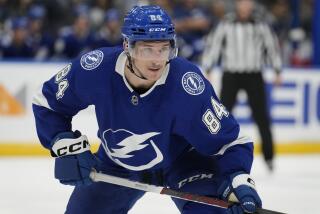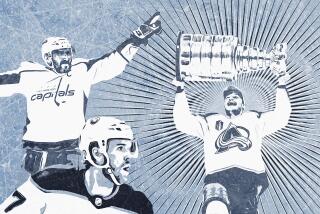Capitals Take a Rest After Tour
- Share via
Call it a once-in-a-lifetime experience, because there may never be another.
After the Washington Capitals concluded their l6-day European tour with a 5-4 victory over SKA Leningrad Thursday, Coach Bryan Murray was asked by a Soviet journalist if he would like to come back next year.
“Maybe some time in the future, but not next year,” Murray replied. Later, beyond the risk of insulting his hosts, he elaborated, “Some time way off in the future.”
The Capitals returned Friday by Aeroflot charter from Leningrad and brought with them innumerable souvenirs, along with some pleasant memories and a feeling that bordered on exhaustion. Murray himself was ill and the 12-hour journey home was torture for him.
“It’s over. Now we rest for a few days and then we have a lot of hard work to prepare for the season,” Murray said. “I think this trip will be beneficial. I certainly hope so.”
The Capitals won five of six games, a remarkable feat considering the travel involved, the unfamiliar surroundings and the oversized ice surface on which all of the games were played.
“I was asked before we left if I realized we could lose every game,” Murray said. “It was not an unreasonable question. We had been practicing less than a week before our first game and we were playing good skating teams that had been in training for two months.
“What I really liked was the way we battled back. We were down, 3-0, to Farjestads and won. We were down, 2-0, to Spartak and won, and we were down, 3-0, to SKA and won. We showed mental toughness that just wasn’t there in a lot of games last year.”
Murray thinks so much skating on the big rink will be a plus as far as conditioning goes. But he admits it is impossible to gauge whether the rigors of the journey will hang on long enough to affect the start of the season.
In 1987 many of the players who participated in the Canada Cup got off to slow starts. Analysts are still unsure whether it was because they found regular-season NHL competition a drag after the high-powered Cup or whether other factors were involved.
Certainly the upcoming exhibition games -- two against Boston and two against Philadelphia -- will provide a different sort of test. Some players prospered in the skating game in Europe. Others could not keep up with the speedy Soviets, but their physical presence will be needed to keep muscular NHL clubs honest.
“It’s going to be different,” said defenseman Neil Sheehy. “It’s one thing to knock the Soviets around the way we were doing, but it’s a different story when you know you’re going to have to pay.”
It appears two NHL teams will be making the Soviet swing each season, with Montreal and the New York Rangers tentatively tabbed for next year. They will benefit greatly from the pathfinding efforts of Washington and Calgary.
“It’s nice to be able to say we were first, but the teams that follow will have a much easier time,” said marketing director Lew Strudler, the Capitals’ troubleshooter. “I’m preparing a report on the tour, pointing out possible pitfalls and other things we would have done differently had we known.”
Many of the problems the Capitals faced could have been overcome had there been a greater understanding of the Soviet mind. It is not enough to accept the Soviets’ assurances of “ne problema.” One must dig deeper and insure that the details are being attended to.
One can imagine the reaction of the huge New York and Montreal contingents to the news that greeted Washington’s smaller group Wednesday in Leningrad: No outgoing phone calls until Friday night.
Munson Campbell, former president of the California Seals, accompanied the Capitals as a guest of NHL President John Ziegler. After viewing the incongruities of life in Moscow and Leningrad, Campbell put things in perspective.
“In Moscow they have chandeliers in the subway and you can’t find a bar of soap,” Campbell said. “In Leningrad they have the world’s largest collection of Rembrandts and you can’t drink the water.”
Each day in Leningrad, platters of cucumbers, tomatoes, grapes and other produce were placed before the Capitals. None of it was touched, because it was washed in city-supplied water that contains a nasty parasite called giardia lamblia that can make a visitor very ill.
There was a choice: Insult the hosts and avoid waste in a nation in which food is in short supply or let it sit there and hope it wasn’t thrown out. The Capitals chose the latter course, but Strudler will recommend that future visitors inform Leningraders they do not wish salads or fresh fruit.
After seeing that mutton was scheduled for dinner in Moscow, Strudler worked with the Soviets to come up with more palatable entrees for the players. The joint operation resulted in excellent meals throughout the tour.
More to Read
Go beyond the scoreboard
Get the latest on L.A.'s teams in the daily Sports Report newsletter.
You may occasionally receive promotional content from the Los Angeles Times.






